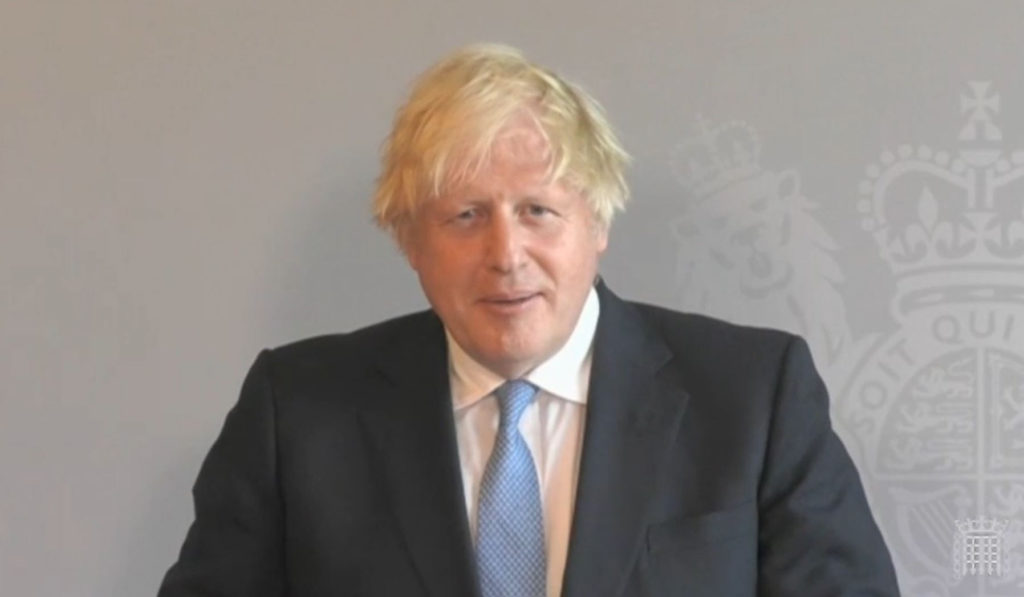Are sleaze scandals and lax standards undermining your platform of “professionalism”? Are your MPs depressed and anxious about their long-term futures? Is the feeling of forthcoming electoral annihilation leaving said MPs myopic about a predecessor’s indiscretions? The symptoms, I’m afraid, amount to a malignant case of “long Boris”.
The thinking behind “long Boris” — a recent addition to the Westminster vernacular — is pretty simple. Seven months on from Johnson’s defenestration, it is a term coined to capture the lingering effects of the former prime minister in Conservative politics and the culture of governance in Whitehall.
Proponents of the “long Boris” theory say it explains the current impasse in British politics, as problems which became so endemic during Johnson’s time in Downing Street continue to thwart Rishi Sunak’s political prospects. Certainly, the recent slew of sleaze scandals create the sense of a prime minister under siege, struggling to deal with the debilitating implications of Johnson’s flexible approach on standards.
On Sunday, the report from the government’s independent ethics adviser concluded that Nadhim Zahawi had “shown insufficient regard for the General Principles of the Ministerial Code” over his tax affairs. Rishi Sunak received the information at 7.00 am and not two hours later was Zahawi officially jettisoned. It was an attempt to seem decisive and purposeful, but the move failed to silence critics who riposted: “too little, too late”.


Zahawi became the latest in a long line of Conservative parliamentarians to succumb to allegations of “sleaze” — following a path already trodden by Chris Pincher, Owen Paterson and Gavin Williamson. The drip-drip of the Zahawi scandal, whereby reported wrongdoing was first denied and defended before being deemed worthy of the sack, cast minds back to the ailing months of Johnson’s administration.
On the surface at least, the Zahawi affair seems to be an open-and-shut case of “long Boris”. Zahawi’s appointment as chancellor was one of the final acts of Johnson’s ailing premiership. It was a decision which placed the YouGov co-founder in ultimate control of HMRC, while, reports suggest, its officials probed his finances. Of course, we do not know for sure what Johnson knew of these matters, but the former prime minister’s flexible approach to standards, coupled with the fact that the then-PM was facing political oblivion, could suggest that he was not quite as rigorous as he could have been on Zahawi’s financial foibles. Now, it seems, Rishi Sunak is reaping the political consequences.
Johnson’s central role in the Zahawi story, at the same time the former PM was facing questions surrounding his own finances in a story implicating the chair of the BBC, shows how “long Boris” can cloud the political landscape. It has sucked any political momentum Sunak might have mustered since October, reopening old wounds in his party and the country.
It is a particular problem for Sunak, who sold himself to the public last October as the sleaze-buster-in-chief. Upon first entering No 10, Sunak promised to sweep up everything that had gone wrong under Johnson with a new administration headlined by “integrity, professionalism and accountability”. But as the Zahawi affair underlines anew, Sunak has so far been able to catalyse a refreshed and renewed approach to government.
It is worth noting, however, that Johnson’s legacy cannot merely be confined to “sleaze” and the practical implications of his lax approach to standards. The politics here are more complicated and, potentially, even more debilitating.
For in 2019, Sunak was elected like the rest of his parliamentary party as part of a Conservative majority won by Johnson. And although many MPs regret how events played out after the 2019 election, there is no disguising that the Conservative party was elected on an unmistakably Johnsonite platform, with a mandate conditioned specifically to the appeal of the then-prime minister.
The problem for Sunak is that Johnson’s populism is not so easily buried. For the former PM’s political instincts appear to have sucked Conservative politics into a policy vacuum, just as difficult to escape as any moral one. We saw this play out in real-time during Sunak’s tour of the country to announce new levelling up funding.
Levelling up was Johnsonianism distilled: a catchy slogan, a few billion quid and a monument to point to at the end of it all. It was central to his political brand, encapsulating the stated concern with spreading opportunity across the country and Britain’s high hopes for societal betterment post-Brexit. Rishi Sunak, on the other hand, still has his heart and his head in the treasury. Whereas Boris Johnson never saw a spending commitment he didn’t like, our current prime minister likes to be seen realist, telling “hard truths”. The harder the truth for the current PM – be it on strikes or the economy – the better.
So “long Boris” is not an easily remediable disorder. In terms of both policy and standards, Johnson’s problematic legacy is exacting a heavy toll. And with Johnson preparing for a series of public clashes with privileges committee, who are investigating whether he lied to MPs about the “partygate” affair, the corrosive spectre of Sunak’s former boss looks set to loom larger still.
Politically, Johnson’s appearance before the privileges committee will remind the public that Sunak, too, was accosted with a “partygate” fine. It seems that wherever the political winds blow, Sunak is destined to be haunted by his predecessor, cursed forevermore by his political and moral missteps.












